Related Research Articles
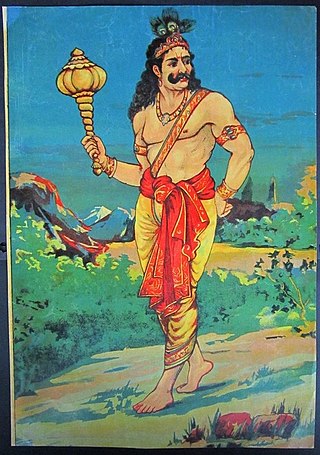
Bhima, also known as Bhimasena, is a divine hero and one of the most prominent figures in the Hindu epic Mahabharata, renowned for his incredible strength, fierce loyalty, and key role in the epic’s narrative. As the second of the five Pandava brothers, Bhima was born to Kunti—the wife of King Pandu—through the blessings of Vayu, the wind god, which bestowed upon him superhuman strength from birth. His rivalry with the Kauravas, especially Duryodhana, defined much of his life, with this tension ultimately erupting in the Kurukshetra War, where Bhima killed all hundred Kaurava brothers.
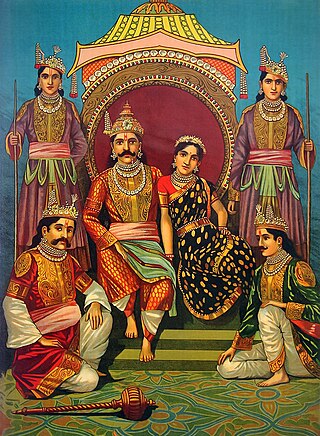
The Pandavas is a group name referring to the five legendary brothers, Yudhishtira, Bhima, Arjuna, Nakula and Sahadeva, who are central figures of the Hindu epic Mahabharata. They are acknowledged as the sons of Pandu, the King of Kuru, but were fathered by different Devas (gods) due to Pandu's cursed inability to naturally conceive children. In the epic, the Pandavas married Draupadi, the princess of Panchala, and founded the city of Indraprastha after the Kuru Kingdom was split to avoid succession disputes. After the split, the other part of the kingdom was ruled by their cousins, the Kauravas. However, the Pandavas lost their kingdom to Duryodhana when Yudhishtira gambled it away during a game of dice. The bet Yudhishtira agreed to was that the Pandavas would hand the kingdom to the Kauravas and go into exile for 13 years. After this time the Kauravas refused to return the kingdom. As a result, the Pandavas waged a civil war against their extended family, and this conflict was known as the Kurukshetra War. With the help of the god Krishna, the Pandavas eventually won the war with the death of the Kauravas, albeit at great cost.
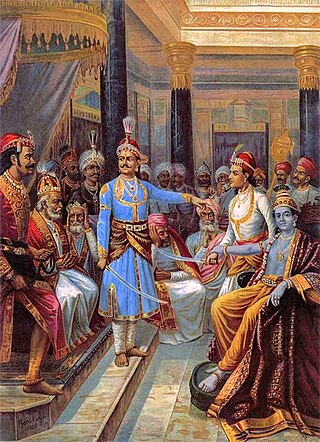
Duryodhana, also known as Suyodhana, is the primary antagonist in the Hindu epic Mahabharata. He was the eldest of the Kauravas, the hundred sons of the king Dhritarashtra and his queen Gandhari.

Droṇa, also referred to as Dronacharya, is a major character of the Hindu epic Mahabharata.

Yudhishthira also known as Dharmaraja, was the king of Indraprastha and later the King of Kuru Kingdom in the epic Mahabharata. He is the eldest among the five Pandavas, and is also one of the central characters of the epic.

Nakula was the fourth of the five Pandava brothers in the ancient Indian epic, the Mahabharata. He and his twin brother Sahadeva were the sons of Madri, one of the wives of the Pandava patriarch Pandu, and Ashvini Kumaras, the divine twin physicians of the gods, whom she invoked to beget her sons due to Pandu's inability to progenate. Nakula is described as the most handsome man of his lineage, and was renowned for his beauty, skill in swordsmanship and horse keeping.

Shikhandi is a character in the Hindu epic Mahabharata. Born as Shikhandini, daughter of Drupada, the King of Panchala, Shikhandi becomes male after agreeing to a sex exchange with a yaksha. He is the brother of Draupadi, the female protagonist of the epic, who is the common wife of the Pandavas.

Kripa, also known as Kripacharya, is a figure in Hindu mythology. According to the epic Mahabharata, he was a council member of Kuru Kingdom and a teacher of the Pandava and Kaurava princes.

The Kurukshetra War, also called the Mahabharata War, is a war described in the Hindu epic poem Mahabharata, arising from a dynastic struggle between two groups of cousins, the Kauravas and the Pandavas, for the throne of Hastinapura. The war is used as the context for the dialogues of the Bhagavad Gita.
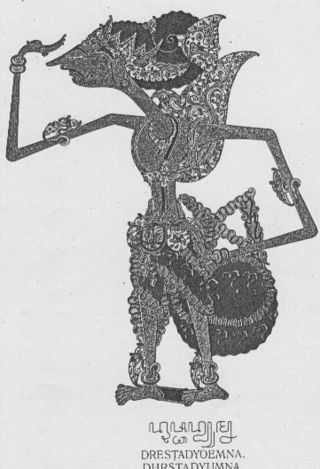
Dhrishtadyumna is the son of Drupada—the king of the Panchala kingdom—and the twin brother of Draupadi in the Hindu epic Mahabharata.

Yuyudhana, better known as Satyaki, was a powerful Yadava chieftain of Narayani Sena, belonging to the Vrishni clan to which Krishna also belonged. According to the Puranas, he was the grandson of Shini of the Vrishni clan, and son of Satyaka, after whom he was named. A valiant warrior, Satyaki was devoted to Krishna and was a student of Arjuna.
The Kekeya kingdom was a kingdom mentioned in the ancient Indian epic Mahabharata among the western kingdoms of then India. The epic Ramayana mentions one of the wives of Dasharatha, the king of Kosala and father of Rama, was from Kekeya kingdom and was known as Kaikeyi. Her son Bharata conquered the neighbouring kingdom of Gandhara and built the city of Takshasila. Later the sons and descendants of Bharata ruled this region from Takshasila.

Mahabharat is an Indian Hindi-language epic television series based on the ancient Sanskrit epic Mahabharata. The original airing consisted of a total of 94 episodes and were broadcast from 2 October 1988 to 24 June 1990 on Doordarshan. It was produced by B. R. Chopra and directed by his son, Ravi Chopra. The music was composed by Raj Kamal. The script was written by Pandit Narendra Sharma and the Hindi/Urdu poet Rahi Masoom Raza, based on the epic by Vyasa. Costumes for the series were provided by Maganlal Dresswala. The serial claims to have used the Critical Edition of Bhandarkar Oriental Research Institute as its basic source with Vishnu Sitaram Sukthankar and Shripad Krishna Belwalkar as its primary editor.

The Bhishma Parva, or the Book of Bhishma, is the sixth of eighteen books of the Indian epic Mahabharata. It has 4 sub-books and 124 chapters.

The Drona Parva, or the Book of Drona, is the seventh of eighteen books of the Indian epic Mahabharata. Drona Parva traditionally has 8 parts and 204 chapters. The critical edition of Drona Parva has 8 parts and 173 chapters.
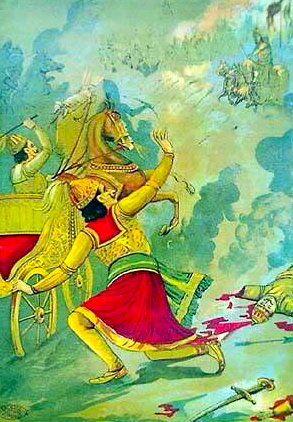
The Karna Parva, or the Book of Karna, is the eighth of eighteen books of the Indian Epic Mahabharata. Karna Parva traditionally has 96 chapters. The critical edition of Karna Parv has 69 chapters

Akrura is a Yadava prince in Hinduism, best known for being the uncle of the deity Krishna. The son of Śvaphalka and Gandini, a daughter of the king of Kashi, he is instructed by Kamsa to drive his nephews, Krishna and Balarama, to a Dhanuryāga at Mathura, where they were to be slain. He bears witness to the vishvarupa (theophany) of Krishna during this journey. Akrura becomes the owner of the Syamantaka jewel after the death of its previous owner, Satrajit. He is slain during the internecine Yadu massacre at Prabhasa.

Ashwatthama, also referred to as Drauni, was a warrior of the Indian epic, the Mahabharata. He was the son of Drona, and Kripi. In the Mahabharata, he served as a friend to Duryodhana, the eldest of the Kauravas. He was trained in warfare along with the Kauravas, and the Pandavas by his father, Drona. He is also described as a Maharathi who fought on the side of the Kauravas against the Pandavas in the Kurukshetra War, and was cursed by Krishna with immortality for his attempt to kill Uttarā's unborn child. Ashwatthama had gained knowledge of various divine weapons, namely the Narayanastra, Brahmastra, Brahmashirastra, and many others.
In the Hindu epic Mahabharata, Vrishasena was the eldest son of the warrior Karna. Along with his father, he fought in the Kurukshetra war from the side of the Kauravas and faced many prominent warriors like Upapandavas, Drupada, Dhrishtadyumna, Nakula, Sahadeva, Virata and many more.
References
- ↑ Himanshu Agarwal (20 August 2019). Mahabharata Retold Part-2. Notion Press. pp. 49–. ISBN 978-1-64587-785-1.
- ↑ Pargiter, F.E. (1972). Ancient Indian Historical Tradition, Delhi: Motilal Banarsidass, p.105.
- ↑ www.wisdomlib.org (2019-01-28). "Story of Kṛtavarmā". www.wisdomlib.org. Retrieved 2022-12-01.
- ↑ Uberoi, Meera (2005). The Mahabharata. Penguin Books India. p. 252. ISBN 978-0-14-303358-5.
- ↑ Gandhi, Rajmohan (2000-10-14). Revenge and Reconciliation: Understanding South Asian History. Penguin UK. p. 25. ISBN 978-81-8475-318-9.
- ↑ Mani, Vettam (2015-01-01). Puranic Encyclopedia: A Comprehensive Work with Special Reference to the Epic and Puranic Literature. Motilal Banarsidass. p. 431. ISBN 978-81-208-0597-2.
- ↑ Valmiki; Vyasa (2018-05-19). Delphi Collected Sanskrit Epics (Illustrated). Delphi Classics. p. 8826. ISBN 978-1-78656-128-2.

